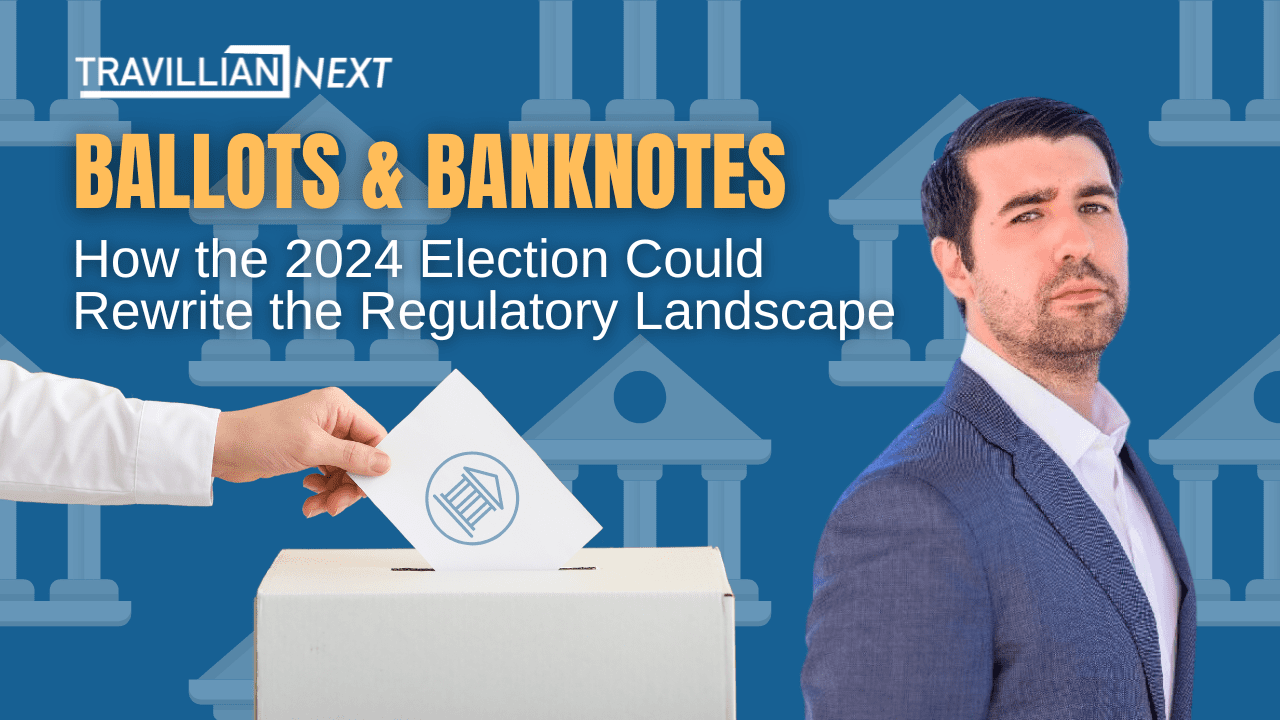As the regulatory landscape for fintech and artificial intelligence continues to evolve, the American Fintech Council (AFC) remains a key advocate for innovation and fair oversight. AFC’s Ian Moloney offers insights into several regulatory challenges, from fintech partnerships and data rights to AI legislation and banking oversight, underscoring the importance of careful, evidence-based policymaking.
Moloney’s industry assessments were captured in his recent interview with Travillian Principal of Banking & Fintech Search Keith Daly.
The Impact of Presidential Leadership on Fintech Policy
The 2024 election is shaping up to be pivotal for the fintech industry, with both federal and state races likely to impact regulatory policies. Moloney solidly assures that the presidential election will shape the regulatory environment, especially for fintech companies that work closely with banks.
He explains that a win by Vice President Kamala Harris might signal a continuation of the current administration’s policies with a shift toward a more centrist approach. Harris, with her Bay Area background, could bring a unique perspective to fintech regulation, potentially softening the “fast and furious” regulatory agenda seen during the Biden administration.
On the Republican side, Moloney anticipates a deregulatory approach, particularly if Donald Trump gains control of the White House. In this scenario, existing Biden-era rulemakings might be rolled back, and structural changes to agencies like the Consumer Financial Protection Bureau (CFPB) could be introduced. Moloney warns that policy volatility is problematic for fintech companies: “That’s not a good way to run a company, especially a financial services company.” For fintech firms, having regulatory consistency is essential to ensuring they can plan long-term strategies.
Section 1033: Transforming Financial Data Rights
One of the most significant regulatory efforts currently underway is the implementation of Section 1033 of the Dodd-Frank Act, which focuses on personal financial data rights.
Moloney highlights the long journey this rulemaking has taken, starting in 2016, with early skepticism from traditional financial institutions about sharing consumer data with fintech companies. “The industry has come a very long way,” Moloney notes, particularly with the rise of API technology that has allowed banks and fintechs to collaborate more effectively.
The CFPB is expected to finalize its rulemaking around Section 1033 in late 2024, and Moloney stresses the importance of not placing overly restrictive limits on how consumer data can be used. He argues that the secondary use of data—such as cross-selling financial products—should not be hindered, as this could reduce innovation and consumer choice. The rule’s finalization represents a transformative shift in how data is shared, with the potential to greatly benefit both consumers and the financial services industry.
The Benefits and Risks of Third-Party Partnerships to Fintech Companies
Third-party arrangements between banks and fintech companies have come under increasing scrutiny, especially considering recent regulatory actions. The inter-agency request for information (RFI) on third-party arrangements, issued by the FDIC, OCC, and Federal Reserve, seeks to better understand the risks and benefits these collaborations present. Moloney describes the RFI as an important moment for the industry, explaining that regulators are asking the public and industry experts to weigh in on these relationships.
Moloney views this as a positive development, particularly for underserved communities that have benefited from fintech innovations. He also notes that not all fintech partnerships are created equal, and there are “leading practices” that regulators should consider, such as effective onboarding processes and mitigation of concentration risk. “These sorts of things actually are very helpful to ensure that some of the enforcement actions we’ve seen in 2024 are not continuing to come up,” Moloney adds, underscoring the importance of aligning industry practices with regulatory expectations.
Are Prioritization of Brokered Deposits a Controversial FDIC Decision?
Another area of concern for Moloney and the AFC is the FDIC’s renewed focus on brokered deposits. Moloney argues that the FDIC may be placing too much emphasis on brokered deposits while neglecting the more pressing issue of uninsured deposits, as highlighted by reports from the U.S. Government Accountability Office and the FDIC’s Office of Inspector General. “The unfortunate part is that the FDIC has opted to pursue broker deposits, but has not discussed the uninsured deposits… that were actually more to blame,” Moloney points out.
If the FDIC’s proposed changes to brokered deposit regulations are finalized, Moloney warns that they could create a new regime that would make it more difficult and costly for fintechs to offer their products. This shift could be particularly harmful to underserved communities, which have benefited from the current regulatory framework. “It’s not a good news story,” he admits, but assures that the AFC and other trade associations are actively engaged in trying to address the issue.
AI Regulation in the Financial Industry
As AI technology rapidly evolves, the regulatory framework has struggled to keep pace. States like California and Colorado have led the way in passing AI laws, but even these efforts may require significant revisions before implementation. Moloney reflects on the challenges of regulating a technology that is still developing across multiple use cases, from machine learning to generative AI. “It’s almost, in some ways, too early” for comprehensive AI regulation, Moloney says, emphasizing the need for a unified, federal approach rather than a patchwork of state laws.
In the context of financial services, AI regulation should be “activity-specific and context-specific,” Moloney advises. Different AI applications—whether underwriting loans or detecting fraud—carry distinct risks and require tailored regulatory oversight. He also underscores the importance of ensuring that financial institutions’ compliance and risk teams are adequately trained in AI. “It’s important to be thinking about: How are they engaging? Who are they bringing on? What programs and services for the onboarding process are they ensuring?”
While Moloney remains optimistic about the future of AI regulation, he recognizes the complexity of the task. As fintech companies continue to integrate AI into their operations, the regulatory environment must evolve in tandem to ensure both innovation and consumer protection.
Navigating the Challenges and Opportunities of the Fintech Landscape
Moloney’s insights reflect the ongoing tension between innovation and regulation in the fintech and financial services sectors. From the potential impact of the 2024 election to evolving regulations around financial data and AI, the industry faces both challenges and opportunities. For the American Fintech Council, the focus remains on advocating for policies that foster growth while ensuring responsible oversight, particularly in serving historically underserved communities. As Moloney aptly puts it, “Policymakers, regulators should always be operating from a position of understanding… the products and services that they’re regulating or that they’re engaging with.”
The full interview between Travillian’s Daly and the AFC’s Moloney is available at travilliannext.com.




















